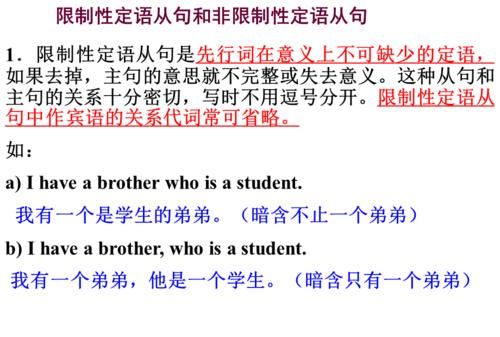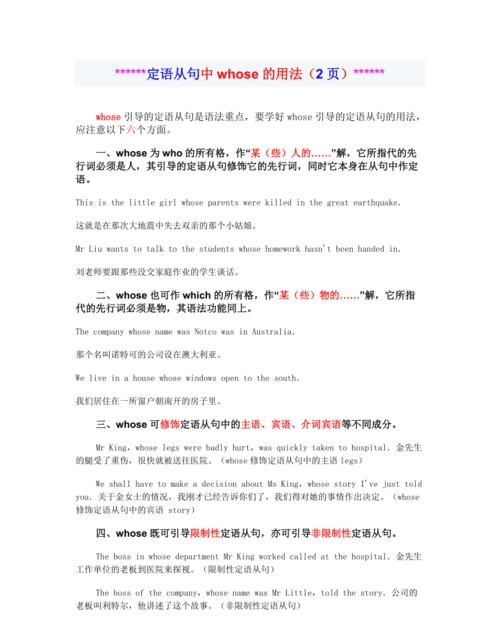本文目录
定语从句例句50句带翻译分析简单
定语从句例句带翻译:
1.I have some photos that I took in Australia last year.
我有一些去年在澳大利亚拍的照片。
2.The horse that I rode was lazy.
我骑的那匹马很懒。
3.The film that tells an adventure is very interesting.
那部关于探险的电影非常有趣。

4.The writer that I like best is Mark Twain.
我最喜欢的作家是马克吐温。
5.The photo which we liked best in the City and People group was taken by Zhao Min.
在“城市与人”这组照片中,我们最喜爱的是由赵敏拍摄的。
6.A group of photos which show Beijing and Cambridge in England has won the prize for the subject Home and Away.
一组展示北京和英国剑桥的照片赢得了“故士与他乡”这一主题的奖项。
7.He is the boy who won the photo competition last year!
他就是去年赢得摄影比赛的那个男生!

8.Thanks to everyone who entered the competition.
感谢所有参加本次比赛的参赛者。
9.I took some photos for the soldiers whom I met in the army.
我给在部队里碰到的战士们拍了一些照片。
10.Did you go to the talk(that/which)the famous scientist gave at your school ?
你去听那位著名科学家在你们学校做的演讲了吗?
11.Is that the car (that/which) you bought last month?
那是你上个月买的车吗?
12.A friend is a person (who/whom) you know very well and like.
朋友是你十分理解并且喜欢的人。
13.I’d love to have parents who understand me.
我希望父母理解我。
14.He can make lessons that are usually boring interesting.
他能把通常枯燥乏味的课讲得生动有趣。
15.Please forget the girl who has ever hurt you heavily.
请把伤你的心的女孩忘了吧。
16.We will never forget the place where we play basketball together.
我们永远不会忘记我们一起打篮球的地方。
17.This is the room which/that I live in.
这就是我住的房间。
18. This is the reason why he was late.
这就是为什么他迟到的原因。
英语定语从句经典例句
高中定语从句经典例句 篇1
1)I went to visit the American author who wrote a number of books about China.
2)I ate the soup my aunt prepared.
3)I have an arrangement with my bank,by which they let me use their money and repay them next month.
4)He sent her a letter,in which he said that he was sorry for what he had done to her.
5)Mr.Brown,who just came from Britain yesterday,will teach us accounting this term.
6)She is going to spend the winter holidays in Hainan,where she has some relatives.
7)The United States is known for its supermarkets,where huge quantities of all kinds of food and household articles are sold.
8)The story happened in late 19th century,when China is suffering from the invasion of western powers.
高中定语从句经典例句 篇2
as引导的定语从句
在一些习惯用法上,as能兼作关系代词、关系副词,经常引导定语从句。
惯用型1:
such… as…像……一样的
the same…as…与……同样的
I seldom meetsucha beggarasI met today.
我很少碰到今天这样的乞丐。
(as是代词,在定语从句中作宾语)
Please choosesuchapplesascan be put in my bracket.
请选择我能放入篮子里这样的苹果。
(as在定语从句中作主语)
I am notthe samekind of personasyou are.
我可不是和你一类的人。
(as在从句中作表语)
You may takethe samebusaswe take.
你可乘坐我们坐的同一辆大巴。
(as在从句中作宾语)
惯用型2:
such as…
在这种场合,such是代词,表示“这种人、这种物”,as是关系代词。
He is notsuchasyou can imagine.
他不是你能想象得到的那种人。
We have got a lot of drinkssuchasyou can find in supermarkets.
我们习了大量在超市能找到的那种饮料。
惯用型3:
as……,as…
as引导的定语从句,有时像非限制性定语从句一样修饰整个主句或者主句的一部分,但它的位置比较灵活,可以放在被修饰的主句后面,也可以放在主句前面。
例如:
Asyou can see,we are all students.
你能看得出,我们都是学生。
=We are allstudents,asyou can see.
=We are all students,whichyou can see.
(这是详细的解读,大家请熟悉啊)
Asyou know,we need to hurry up.
大家知道,我们需要加快速度。
He is not very honest,asyou have proved.
她不是很诚实,这一点你已证实了。
高中定语从句经典例句 篇3
1)Then I decided to leave,feeling a weight at my heart,such as I have never had before.
然后我决定离开,心里感到一种以前从来没有过的心情。
2)We had hoped to give you a chance,such as nobody else ever had.
我们本来希望给你一次机会,一个别人从来没有过的机会。
3)HedescribeshappeningssuchasIseearoundme.
他所描写的事情就象我看到在我周围所发生的。
4)Ihavenoaspirationssuchasyouimputetome.
我可没有你归罪于我的这些欲望。
such + as引导的定语从句还可用作主语或宾语。 如such指代人,相当于those who; 如such指代物,相当于what或 whateve,all/anything that 等。
1)Such as have knowledge and skillwill not want to work.(相当于those who have knowledge and skill)
有知识和技能的人不愁没有工作。
2)Such as alter in a momentwin no credit in a month.(相当于those who alterin a moment)
那些朝令夕改的人是不会获得人们长久信任的。
3)Associate withsuch as will improve your manner.(相当于those who will improve your manner)
要或那些能提高你礼貌修养的人交往。
4)Such as remains after taxwill be yours when I die.(相当于what remains after tax)
我死以后全部财产除了税以外都给你。
5)You may choosesuch asyou prefer.(相当于what you need)
你可挑选自己想要的东西。
6)I haven’t much many specimens but I will send yousuch asI have.(相当于all that I have)
我有的标本不多,不过我愿把所有的标本送你。
高中定语从句经典例句 篇4
that常用作关系代词,可指代某人,也可指代某物,指物时有的时候可用which替换that,指人时可用who替换。但在下列情况下,一般用that。
一、that指代某物事时
1.先行词为all,few,little,much,the one,something,anything,everything,nothing等时。如:
(1)We'll do all that we can to protect the endangered plants and animals.
我们将尽我们的最大努力来保护那些濒危的动植物。
(2)There is much that I wan to tell you.
我有很多想要告诉你的话。
(3)Is there anything that I can do for you?
有什么我可以帮你的吗?
2.先行词被all,every,no,some,any,(a)few,(a)little,much等限定词修饰时。如:
(4)You can borrow any book that you want to read in our school library.
在我们图书馆,你可以借任何你想读的书。
3.先行词被序数词或形容词最高级修饰时。如:
(5)This is the most beautiful city that I've ever seen.
这是我见过的最漂亮的城市。
4.先行词被the only,the very,the right,the last 等修饰时。如:
(6)This is the very factory that they visited last summer holiday.
这恰好是他们去年参观的那个工厂。
(7)This is the only painting in this style that we have.
这种风格的画我们仅有一幅。
5.先行词是并列结构,既有人又有物时。如:
(8)He talked happily of the writer and his books that interested him.
6.先行词前有the same 修饰,表示和先行词是同一物时。如:
(9)This is the same purse that I lost yesterday.
这就是我昨天丢的那个钱夹。
注:如果表示的是与先行词同一类或相似的某物,则用the same…as….如:
(10)This is the same purse as I lost yesterday.
这个钱夹和我昨天丢的那个一样。
7.先行词为数词时。
(11)Look at the books on the bookshelf.You can see the two that you bought me for my birthday.
瞧书架上那些书。你可以看到我过生日时你买的那两本。
8.如果which引导的定语从句中又含有一个定语从句,为避免重复,第二个定语从句用that。如:
(12)They built a factory which produced things that had never been seen.
他们建了一工厂,生产以前从未见过的东西。
9.以which作主语开头的特殊问句,为了避免重复,定语从句用that。如。
(13)Which is the bus that you will take?
你要乘的是哪一班车?
10.关系代词在定语从句中作表语时,而且通常省略。如:
(14)My hometown is no longer the place that it used to be.
我的家乡再也不是以前那个样子了。
11.关系代词在there be 句型中作主语时,而且常可以省略。如:
(15)This is the fastest train (that)there has ever been.
这是有史以来最快的列车。
二、that 指代某人时。
1.泛指某人时。如:
(16)He is a man that is never at a loss.
他是一个从未一筹莫展的人。
2.主句是以作主语的who开头的特殊问句,为了避免重复时。如:
(17)Who is the person that is talking with our headmaster?
和我们校长说话的那人是谁?
3.先行词前有the same时。如:
(18)This is the same man that gave us a talk last year.
这和去年给我们作报告的是同一人。
4.关系代词在定语从句中作表语时。如:
(19)He has changed.He was not the man (that)he was 10 years ago.
他变了。他再也不是10年前的他了。
另外,that也可用作关系副词,表示时间、地点、原因和方式,在口语中可以用来代替when,where,why 引导的定语从句。在以下名词day,year,time,moment,reason,place等作先行词时,可用that作关系副词引导定语从句。如:
(20)I'll never forget the day (that)I joined the League.
我永远不会忘记我入团的那一天。
(21)Is this the reason (that)they were late for the meeting?
这就是他们开会迟到的原因吗?
(22)We want to find a place (that)we can have a picnic.
我们想找一个我们能野餐的地方。
(23)This is the first time that I have been abroad for traveling.
这是我第一次到国外去旅游。
(注:先行词是time,前面有序数词或last修饰时,常用that引导定语从句或者省略。)
当先行词为表示方式的词the way时,可用that引导定语从句,that常可以省略。
(24)I don't the way you speak to her.
我不喜欢你和她说话那种方式。
高中定语从句经典例句 篇5
定语从句在初中英语中的重要性主要体现在完形、阅读和写作中,因此,能否较好的掌握定语从句直接关系到你英语成绩的拔高。其实,定语从句并不难.
一.定语从句的概念
在复合句中,修饰某一名词或代词的从句叫定语从句。被修饰的名词或代词叫先行词,引导定语从句的词叫关系词,定语从句一般放在先行词的.后面。
二.引导定语从句的关系词
引导定语从句的关系词有关系代词和关系副词,常见的关系代词包括that, which, who(宾格whom,所有格whose)等,关系副词包括where, when, why等。关系代词和关系副词放在先行词及定语从句之间起连接作用,同时又作定语从句的重要成分。
三.定语从句的分类
根据定语从句与先行词的关系,定语从句可分为限制性定语从句及非限制性定语从句。限制性定语从句紧跟先行词,主句与从句不用逗号分开,从句不可省去。非限制性定语从句与主句之间有逗号分开,起补充说明作用,如省去,意思仍完整。
四.关系代词的用法
1.that 既可以用于指人,也可以用于指物。在从句中作主语、宾语或表语。作主语时不可省略,作宾语可省略。例如:
Mary likes music that is quiet and gentle.
玛丽喜欢轻柔的音乐。(that作主语)
The coat (that) I put on the desk is blue.
我放在桌子上的那件外套是蓝色的。(that作宾语)
2.which用于指物,在句中作主语、宾语或表语。作主语不可省略,作宾语可省略。例如:
The building which stands near the train station is a supermarket.
位于火车站附近的那座大楼是一家超市。(作主语)
The film (which) we saw last night was wonderful.
我们昨天晚上看的那部电影很好看。(作宾语)
3.who, whom用于指人,who 用作主语,whom用作宾语。在口语中,有时可用who代替whom。who和whom作宾语时也可省略。例如:
The girl who often helps me with my English is from England.
经常在英语方面帮助我的那个女孩是英国人。(作主语)
Who is the teacher (whom) Li Ming is talking to?
正在与李明谈话的老师是谁?(作宾语)
注意:
(1)当定语从句中含有介词,介词放在句末时,who,whom,that, which可省略,但介词在关系代词前时,只能用介词+which/whom结构。例如:
This is the house in which we lived last year.
这是我们去年居住的房子。
Please tell me from whom you borrowed the English novel.请告诉我你从谁那借的这本英文小说。
(2)含有介词的固定动词词组中,介词不可前置,只能放在原来的位置上。例如:
This is the person whom you are looking for.
这就是你要找的那个人。
(3)that 作介词的宾语时,介词不能放它的前面,只能放在从句中动词的后面。例如:
The city that she lives in is very far away.
她居住的城市非常远。
(4)关系词只能用that的情况:
a.先行词被序数词或形容词最高级所修饰,或本身是序数词、基数词、形容词最高级时,只能用that,而不用which.例如:
He was the first person that passed the exam.
他是第一个通过考试的人。
b.被修饰的先行词为all, any, much, many, everything, anything, none, the one等不定代词指物时,只能用that,而不用which.例如:
Is there anything that you want to buy in the shop?
你在商店里有什么东西要买吗?
c.先行词被the only, the very, the same, the last, little, few 等词修饰时,只能用that,而不用which.例如:
This is the same bike that I lost.
这就是我丢的那辆自行车。
d.先行词里同时含有人或物时,只能用that, 而不用which.例如:
I can remember well the persons and some pictures that I saw in the room.
我能清楚记得我在那个房间所见到的人和一些照片。
e.以who或which引导的特殊疑问句,为避免重复,只能用that.例如:
Who is the girl that is crying?
正在哭泣的那个女孩是谁?
f.主句是there be 结构,修饰主语的定语从句用that,而不用which,例如:
There is a book on the desk that belongs to Tom.
桌子上那本书是汤姆的。
(5)关系词只能用which,而不用that 的情况:
a.先行词为that, those时,用which, 而不用that.例如:
Whats that which is under the desk?
在桌子底下的那些东西是什么?
b.关系代词前有介词时,which,而不用that.例如:
This is the room in which he lives.
这是他居住的房间。
c.引导非限制性定语从句,先行词指事物时,用which, 而不用that,例如:
Tom came back, which made us happy.
汤姆回来了,这使我们很高兴。
五.关系副词的用法
1.when指时间,其先行词表示时间,when在定语从句中作时间状语。例如:
This was the time when he arrived.
这是他到达的时间。
2.where指地点,其先行词表示地点,where在定语从句中作地点状语。例如:
This is place where he works.
这是他工作的地点。
3.why 指原因,其先行词是原因,why在定语从句中做原因状语。例如:
Nobody knows the reason why he is often late for school.
没人知道他为什么上学总迟到。
好啦,关于定语从句,你学会了吗?

as在定语从句中的用法及例句
定语从句是由关系代词和关系副词引导的从句,其作用是作定语修饰主句的某个名词性成分,定语从句分为限定性和非限定性从句两种。
(一) 限定性定语从句1. that即可代表事物也可代表人,which代表事物;它们在从句中作主语或宾语,that在从句中作宾语时常可省略关系词,which在从句中作宾语则不能省略。而且,如果which在从句中作“不及物动词+介词”的介词的宾语,注意介词不要丢掉,而且介词总是放在关系代词which的前边,但有的则放在它原来的位置
2. which作宾语时,根据先行词与定语从句之间的语义关系,先行词与which之间的介词不能丢
3. 代表物时多用which,但在带有下列词的句子中用that而不用which,这些词包括all, anything, much等,这时的that常被省略
4. who和whom引导的从句用来修饰人,分别作从句中的主语和宾语,whom作宾语时,要注意它可以作动词的宾语也可以作介词的宾语
5. where是关系副词,用来表示地点的定语从句
6. when引导定语从句表示时间
[注]值得一提的是,表示时间“time"一词的定语从句只用when引导,有时不用任何关系代词,当然也不用that引导
By the time you arrive in London, we will have stayed there for two weeks.
I still remember the first time I met her.
Each time he goes to business trip, he brings a lot of living necessities, such as towers, soap, toothbrush etc.
7. whose是关系代词,修饰名词作定语,相当于所修饰成分的前置所有格
8. 当从句的逻辑主语是some, any, no, somebody, anybody, nobody, something, anything, everything或nothing时,常用there is来引导
(二)非限定性定语从句:非限定性定语从句的作用是对所修饰的成分作进一步说明,通常和主句间用逗号隔开,将从句拿掉后其他部分仍可成立
1. which引导的非限定性定语从句来说明前面整个句子的情况或主句的某一部分
2. 在引导限定性定语从句时,that有时相当于in which, at which, for which或at which
Attitudes towards daydreaming are changing in much the same way that(in which) attitudes towards night dreaming have changed. 人们对白日做梦的态度正在改变,这与人们对夜间做梦的看法的变化有非常相似之处。
I like the music for the very reason that(for which) he dislike it. 我出于某种原因喜欢这种音乐,而他恰恰与我相反。
We arrived the day that(on which) they left. 刚好我们到的那天他们走了。
3. 有时as也可用作关系代词
4. 在非限定性定语从句中,不能用that,而用who, whom代表人,用which代表事物.
一.定语从句及相关术语1.定语从句:修饰一个名词或代词的从句称为定语从句,一般紧跟在它所修饰的先行词后面。
2.关系词:引导定语从句的关联词成为关系词
关系词有关系代词和关系副词。关系代词有that, which, who, whom, whose, as等;关系副词有where, when, why等。
关系词常有3个作用:1,引导定语从句。2,代替先行词。3,在定语从句中担当一个成分。
二.关系代词引导的定语从句
1.who指人,在从句中做主语
(1) The boys who are playing football are from Class One.
(2) Yesterday I helped an old man who lost his way.
2. whom指人,在定语从句中充当宾语,常可省略。
(1) Mr. Liu is the person (whom) you talked about on the bus.
(2) Mr. Ling is just the boy whom I want to see.
注意:关系代词whom在口语和非正式语体中常用who代替,可省略。
(3) The man who/whom you met just now is my friend.
3. which指物,在定语从句中做主语或者宾语,做宾语时可省略
(1) Football is a game which is liked by most boys.
(2) This is the pen (which) he bought yesterday.
如果在从句中做宾语,就用whom或who.比如:
He is the man whom/who I talk to.
如果是在从句中作主语就只能用who.比如:
He is the man who has an English book.
4. that指人时,相当于who或者whom;指物时,相当于which。在定语从句中做主语或者宾语,做宾语时可省略。
(5) The number of the people that/who come to visit the city each year rises one million.
(6) Where is the man that/whom I saw this morning?
5. whose通常指人,也可指物,在定语从句中做定语
(1) He has a friend whose father is a doctor.
(2) I once lived in a house whose roof has fallen in.
whose指物时,常用以下结构来代替
(3) The classroom whose door is broken will soon be repaired.
(4) The classroom the door of which is broken will soon be repaired.
(5) Do you like the book whose cover is yellow?
(6) Do you like the book the color of which is yellow?
三.介词+关系代词引导的定语从句
关系代词在定语从句中做介词宾语时,从句常由介词+关系代词引导
(1) The school (that/which) he once studied in is very famous.
(2) The school in which he once studied is very famous.
(3) Tomorrow I will bring here a magazine (that/which) you asked for.
(4) Tomorrow I will bring here a magazine for which you asked.
(5) We’ll go to hear the famous singer (whom/that/who) we have often talked about.
(6) We’ll go to hear the famous singer about whom we have often talked.

简单定语从句例句20个
简单定语从句例句20个例子如下:
1.This is an old computer which\that works much slower.
2. They stayed with me for three weeks during which time they drunk all the wine I had.

3. The picture (that) we are looking at was drawn by a fifteen-year-old student.
4. The picture at which we are looking was drawn by a fifteen-year-old student.
5. I have many students to whom I am going to send postcards.
6. You’re the only one whose advice he might listen to.
7. I’d like a room whose window looks out over the sea.
8. The explorer took only such men and things as he really needed into the jungle.
9. Such people as have made great contributions to the world should be greatly respected.
10. Let’s meet at the same place as we did yesterday.
11. Shakespeare is a famous writer ,as everyone knows.
12. As everyone knows ,Shakespeare is a famous writer.
13. Shakespeare ,as everyone knows ,is a famous writer.
14. Potato can be grown in places where(in which)it’s too cold to grow rice.
15. I shall never forget the days when(on which)we worked on the farm.
16. Can you tell me the reason why(for which) the car broke down.

17. The reason that the car broke down caused the accident.
18. He told me the way (that\in which)he solved the problem.
19. He told me how to solve the problem.
20. I have been to the places (that\where\in which)the Indians live.
以上就是关于定语从句例句20句划分成分 ,定语从句例句50句带翻译分析简单的全部内容,以及定语从句例句20句划分成分 的相关内容,希望能够帮到您。

